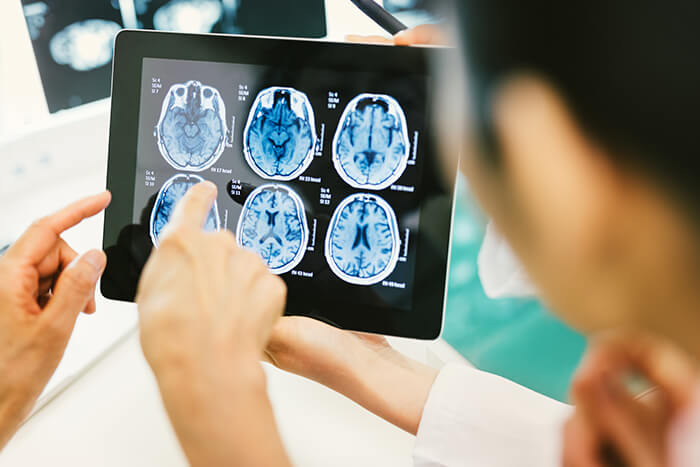What do you think of this article?
By Dr. David Woo - Published on May 15, 2019
Last updated on November 8, 2024

One of the most common questions we are asked here at Madison Avenue TMS & Psychiatry is, “How long until I see results with TMS?” The shortest answer is: The time it takes to notice results with TMS depends on each patient. Are there reasons why some people notice a change in symptoms before others? Let’s take a look.
How Long Does the TMS Treatment Process Take?
At Madison Avenue TMS & Psychiatry, we administer repetitive transcranial magnetic stimulation (TMS) as a one-course treatment over the course of nine weeks total: a six-week course of treatment, followed by a three-week taper period.
How Long Until I See Results With TMS?
Some of our patients report feeling a slight improvement in their symptoms after two weeks of treatment, while others do not report noticeable changes until weeks four or five. If it takes longer to notice symptom relief using TMS compared to someone else, this does not mean that the treatment is ineffective. Ultimately, the effects of TMS are the same: relief of depressive symptoms that are long-lasting.
Factors That May Affect Your Time to Results with TMS
Researchers are working to find trends in TMS response rates. So far, some of the possible factors include:
- Age: Younger patients have been shown to respond better to TMS. (1)
- Personality characteristics: People with higher persistence scores on the Temperament and Character Inventory questionnaire have been shown to respond more to TMS after two weeks of treatment, compared to patients with lower persistence scores. (2)
- Brain activity prior to treatment: Various studies have demonstrated that brain activity prior to TMS treatment may indicate how one responds to TMS treatment. (3)
- The level of treatment resistance: Patients who are less treatment-resistant to antidepressant medications have been shown to respond more positively to TMS. (4)
- Whether you take an antidepressant during treatment: Some patients may experience increased benefits if receiving TMS as an augmentative treatment to their antidepressant medication. (5,6)
TMS Provides Long-Lasting Results
It can be tempting to focus on the short-term effects of any treatment. But it’s important to know that TMS makes its biggest impact with the proven long-term results it provides. A study published in the Journal of Clinical Psychiatry observed adult patients diagnosed with major depressive disorder who did not respond to antidepressant medication. All patients enrolled in the study received a single course treatment lasting six weeks. The results: 62.5 percent of patients were symptom-free and in remission even one year after their initial treatment. (7)
Transcranial Magnetic Stimulation at Madison Avenue TMS & Psychiatry in NYC
Patients can have multiple biological and life factors that contribute to how quickly they will respond to rTMS treatment. Although it is not possible to predict when you will start to feel the effects of TMS, the long-lasting effects of TMS are clinically proven. If you’d like to learn more about TMS in NYC, please contact our office today. Learn more about TMS therapy costs.
Sources:
- Pallanti S, Cantisani A, Grassi G, Antonini S, Cecchelli C, Burian J, Cauli G, and Quercioli L. rTMS age-dependent response in treatment-resistant depressed subjects: a mini-review.
CNS Spectrums. March 2012;17(1):24-30. Link. Accessed April 22, 2019. - Siddiqi SH, Chockalingam R, Cloninger R, Lenze EJ, and Cristancho, P. Use of the temperament and character inventory to predict response to repetitive transcranial magnetic stimulation for major depression. Journal of Psychiatric Practice. May 2016;22(3):193-202. Link. Accessed April 22, 2019.
- Kar SK. Predictors of response to repetitive transcranial magnetic stimulation in depression: A review of recent updates. Journal of Clinical Psychopharmacology. February 2019;17(1): 25–33. Link. Accessed April 22, 2019.
- Fregni F, Marcolin MA, Myczkowski M, Amiaz R, Hasey G, Rumi DO, Rosa M, Rigonatti SP, Camprodon J, Walpoth M, Heaslip J, Grunhaus L, Hausmann A, and Pascual-Leone A. Predictors of antidepressant response in clinical trials of transcranial magnetic stimulation. The International Journal of Neuropsychopharmacology. December 2006;9(6):641-54. Link. Accessed April 22, 2019.
- L Bangshan, Zhang Y, Zhang L, and Li L. Repetitive transcranial magnetic stimulation as an augmentative strategy for treatment-resistant depression, a meta-analysis of randomized, double-blind and sham-controlled study. BMC Psychiatry. 2014;14:342. Link. Accessed April 22, 2019.
- Rumi DO, Gattaz WF, Rigonatti SP, Rosa MA, Fregni F, Rosa MO, Mansur C, Myczkowski ML, Moreno RA, Marcolin MA. Transcranial magnetic stimulation accelerates the antidepressant effect of amitriptyline in severe depression: a double-blind placebo-controlled study. Biological Psychiatry. 2005 Jan 15;57(2):162-6. Link. Accessed April 22, 2019.
- Dunner DL, Aaronson ST, Sackeim HA, et al. A multisite, naturalistic, observational study of transcranial magnetic stimulation for patients with pharmacoresistant major depressive disorder: Durability of benefit over a 1-year follow-up period. The Journal of Clinical Psychiatry. 2014;75(12):1394-401. Link. Accessed April 22, 2019.
Dr. David Woo is the owner and head clinical psychiatrist at Madison Avenue TMS and Therapy in New York City. Dr. Woo has been seeing patients in private practice since 2002, always with the goals of combining evidence-based medicine with psychodynamic psychotherapy and collaborating with other mental health professionals to ensure the best possible outcomes for his patients. He has been certified to administer TMS at his practice since 2017. His greatest clinical interests include helping patients suffering from depression, anxiety, and obsessive compulsive disorder.
Follow Dr. Woo On









